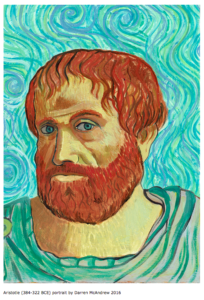
Think that the political philosophy of Aristotle is out-dated? Think again. In this article, Matt Qvortrup — Professor of Political Science at Coventry University — explores the surprising modernity of Aristotle’s works & its relevance to current day politics.
When thinking about government, for example, consider Aristotle’s claim in The Politics that: “the state is not merely a sharing of a common locality for the purpose of preventing mutual injury and exchanging goods.” (1280b) and that while systems of exchange and financial matters “are necessary preconditions of a state’s existence”these in themselves do not make a state…”For a state is a partnership of families and clans living well and its object is the full and independent life.” (1280b). In other words, when we consider politics, we must recognize it as essentially a community. In light of our present election, what might this mean and what does our community look like?
Many of the issues [Aristotle] addressed are also ones that concern us….Moreover, his solutions and analyses are remarkably relevant for our time. – Matt Qvortrup, Professor of Political Science (Coventry University)
Aristotle also provides some timely insight on matters having to do with political violence, revolutions and terrorism, as well as constitutional democracy and collective responsibility. On the latter two, he says: “It is possible that the many, when they come together, may be better, not individually but collectively, just as public dinners to which many contribute are better than those supplied at one man’s cost. For where there are many, each individual, it may be argued, has some portion of virtue and wisdom, and when they have come together, just as the multitude becomes a single man with many feet and many hands and many senses, so also it becomes one personality as regards the moral and intellectual faculties.” (1281b) What might this mean in terms of how we, as individuals, might come together? Is there an imperative to do so? And if so, why?
Aristotle speaks through the ages. His writings are proof, if such is needed, that the philosophy of the ancient masters is not a historical relic but a timeless guide. – Matt Qvortrup, Professor of Political Science (Coventry University)
